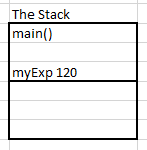Recursion
Recursion is a programming technique that involves a method calling itself. Recursion is possible because of the way frames and the stack work. Here is how.
Recursive exponential calculation
int exp(int i)
{
int total;
if (i==1)
total = 1;
else
{
total = (i * exp(i-1));
}
return total;
}
- To calculate exponential
- 5! = 5*4*3*2*1
- 4! = 4*3*2*1
- 5! = 5 * 4!
- 1! = 1
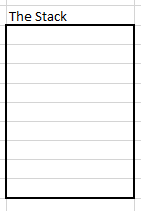
Program starts
main()
{
int myExp = exp(5);
}
int exp(int i)
{
int total;
if (i==1)
total = 1;
else
{
total = (i * exp(i-1));
}
return total;
}
- main() frame created as usual
- myExp created as a variable in main() frame
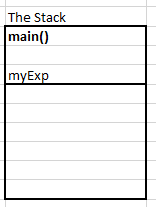
exp(5) Called
main()
{
int myExp = exp(5);
}
int exp(int i)
{
int total;
if (i==1)
total = 1;
else
{
total = (i * exp(i-1));
}
return total;
}
- exp(5) frame created
- local variable i created for the parameter
- parameter copied in to local variable i
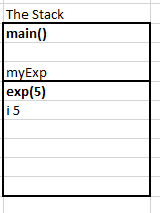
Local Variable total created in exp(5) frame
main()
{
int myExp = exp(5);
}
int exp(int i)
{
int total;
if (i==1)
total = 1;
else
{
total = (i * exp(i-1));
}
return total;
}
- exp(5) frame created
- local variable i created for the parameter
- parameter copied in to local variable i
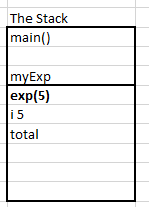
i > 1 so exp(4) Called
main()
{
int myExp = exp(5);
}
int exp(int i)
{
int total;
if (i==1)
total = 1;
else
{
total = (i * exp(i-1));
}
return total;
}
- i is not 1, total = 5 * exp(4)
- call exp(4)
- exp(4) frame added to stack
- parameter value, 4, copied to local variable i in exp(4) frame
- total created exp(4) frame
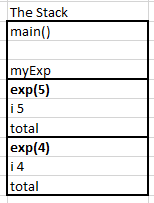
i > 1 so exp(3) Called
main()
{
int myExp = exp(5);
}
int exp(int i)
{
int total;
if (i==1)
total = 1;
else
{
total = (i * exp(i-1));
}
return total;
}
- i is not 1, total = 4 * exp(3)
- call exp(3)
- exp(3) frame added to stack
- parameter value, 3, copied to local variable i in exp(3) frame
- total created exp(3) frame
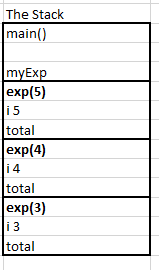
i > 1 so exp(2) Called
main()
{
int myExp = exp(5);
}
int exp(int i)
{
int total;
if (i==1)
total = 1;
else
{
total = (i * exp(i-1));
}
return total;
}
- i is not 1, total = 3 * exp(2)
- call exp(4)
- exp(2) frame added to stack
- parameter value, 2, copied to local variable i in exp(2) frame
- total created exp(2) frame
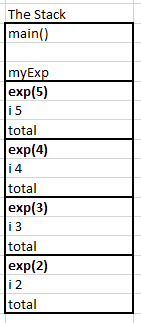
i > 1 so exp(1) Called
main()
{
int myExp = exp(5);
}
int exp(int i)
{
int total;
if (i==1)
total = 1;
else
{
total = (i * exp(i-1));
}
return total;
}
- i is not 1, total = 2 * exp(1)
- call exp(1)
- exp(1) frame added to stack
- parameter value, 1, copied to local variable i in exp(1) frame
- total created exp(1) frame
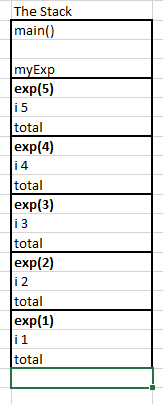
i == 1 We stop recursing
main()
{
int myExp = exp(5);
}
int exp(int i)
{
int total;
if (i==1)
total = 1;
else
{
total = (i * exp(i-1));
}
return total;
}
- i is 1, total = 1
- return 1 to calling method - exp(2)
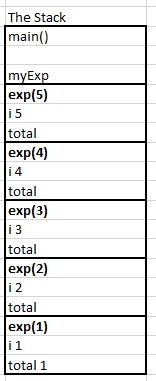
We finalise exp(2)
main()
{
int myExp = exp(5);
}
int exp(int i)
{
int total;
if (i==1)
total = 1;
else
{
total = (i * exp(i-1));
}
return total;
}
- total = 2 * value returned here = 2 * 1 = 2
- return 2 to calling method - exp(3)
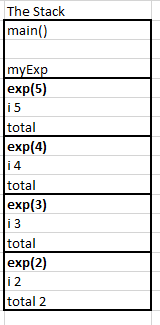
We finalise exp(3)
main()
{
int myExp = exp(5);
}
int exp(int i)
{
int total;
if (i==1)
total = 1;
else
{
total = (i * exp(i-1));
}
return total;
}
- total = 3 * value returned here = 3 * 2 = 6
- return 6 to calling method - exp(4)
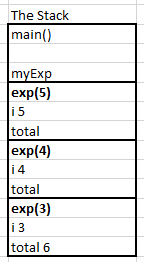
We finalise exp(4)
main()
{
int myExp = exp(5);
}
int exp(int i)
{
int total;
if (i==1)
total = 1;
else
{
total = (i * exp(i-1));
}
return total;
}
- total = 4 * value returned here = 4 * 6 = 24
- return 24 to calling method - exp(5)
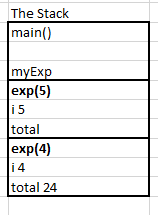
We finalise exp(5)
main()
{
int myExp = exp(5);
}
int exp(int i)
{
int total;
if (i==1)
total = 1;
else
{
total = (i * exp(i-1));
}
return total;
}
- total = 5 * value returned here = 5 * 24 = 120
- return 120 to calling method - main()
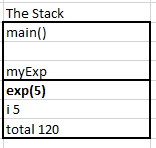
Program ends, stack is empty
main()
{
int myExp = exp(5);
}
int exp(int i)
{
int total;
if (i==1)
total = 1;
else
{
total = (i * exp(i-1));
}
return total;
}
- program ends
- main() frame deleted
